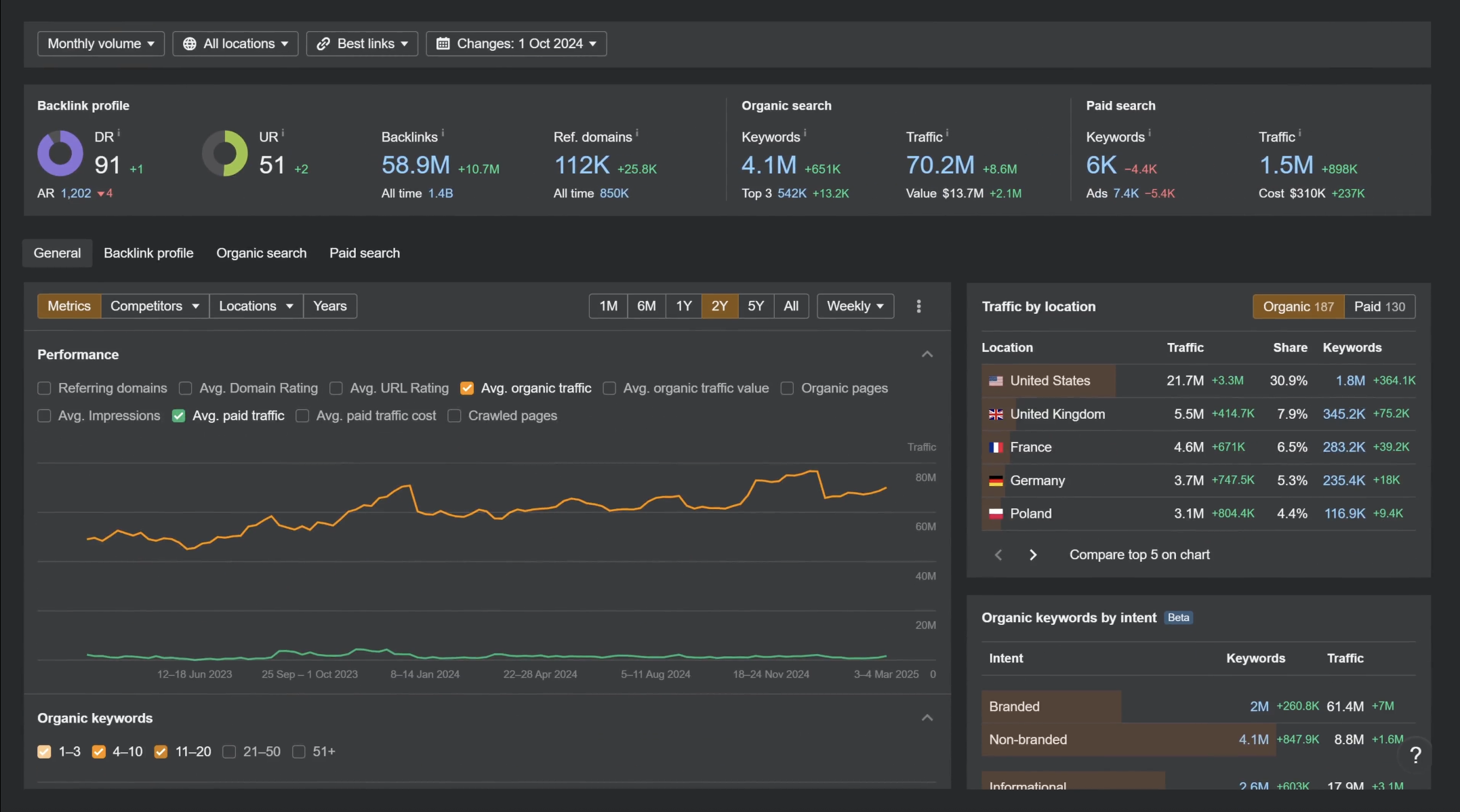How to master SEO for your website
A simple roadmap to getting your site noticed by the right people

Sign up for breaking news, reviews, opinion, top tech deals, and more.
You are now subscribed
Your newsletter sign-up was successful
Mastering Search Engine Optimization (SEO) for your website shouldn’t feel like solving a puzzle with half the pieces missing. At its core, SEO is about helping the right people discover your content and giving them an excellent experience as soon as they land on your page.
Whether you're blogging on WordPress or launching a site with one of the best website builders, smart SEO makes sure your hard work doesn’t get tucked away on page three of Google. On the bright side, you can start improving your rankings right now with a few steps, the right WordPress SEO plugins, and a handful of top SEO tools that make the process much easier.
In this step-by-step guide, we’ll walk you through the strategies that help your pages rank higher, load faster, and woo the audience you actually want.
You’ll discover how to research keywords, write content that matches what people are searching for, structure pages that are simple to follow, and handle the small tech fixes that boost your SEO. These aren’t abstract concepts but tried-and-tested tips you can start using today.
Why trust us? Well, we’ve tried the tools, optimized sites, and watched what actually changes search results. We’ve already done the messy work, and now we’re here to guide you through it.
How search engines work
Results explained

If you’ve ever wondered how Google seems to know what you’re looking for, it’s all thanks to search engines’ behind-the-scenes magic.
This process can be broken down into three steps: Crawling, indexing, and ranking. First comes crawling, where bots explore your site like visitors would. Next is indexing, where all that information gets sorted and (well) indexed. Finally, ranking is when the search engine chooses which pages should get the spotlight in search results.
If your site is slow or confusing, search engines might struggle to read it, which can sabotage your site’s visibility. In contrast, clear headings, solid linking, and high-quality content give search engines the signals they need to show your site to those searching for it.
Here’s a quick breakdown of what search engines look for when evaluating your site:
- Relevance: Is your content what people are really looking for?
- Authority: Do search engines see your site as trustworthy?
- User experience: Is your website swift, mobile-friendly, and simple to navigate?
- Technical health: Are your URLs, meta tags, sitemaps, and links set up correctly for search engines?
Once you nail the basics, you’re already a step closer to mastering SEO. Even without being a tech wizard, knowing how search engines read your site can help you create superior content.
Organic results: What ranking really means

The term "ranking" sounds serious, but really it just means where your page shows up in Google's highly competitive, unpaid search lineup. Search engines sort through countless data points to decide which pages deserve the spotlight based on relevance, usefulness, and trustworthiness. Here’s the crucial part: You can’t buy your way into these spots. Organic rankings are earned, not paid for.
Behind the scenes, algorithms are tirelessly working to match pages with what people are trying to find. That suggests your ranking isn’t carved in stone - it can shift based on things like the user’s location, device, and recent searches.
Still, one thing stays true: The higher you rank, particularly in those top three positions, the more eyes (and clicks) your site gets. Securing that spotlight in the results is pure SEO gold.
Keyword research: Finding the right words people actually search
You can think of keyword research as trying to read your audience's mind. You're tuning into the exact terms they use, rather than sending out random messages into the endless digital space. Search for the terms people type into Google, and your content goes from scattered shots in the dark to laser-focused hits on target.
After you’ve locked onto the power of using data to understand your audience, the next step is getting organized. Start by noting the "seed" ideas your audience already cares about: The big themes, problems, and questions they bring to the table.
From there, you can use keyword research tools such as Ahrefs, Semrush, or even Google’s free keyword planner to gain valuable insight into a keyword's potential and to unlock other ideas. These tools show you real phrases people are typing, which is a treasure trove when you're striving to create content that hits the mark for your audience.
After compiling a robust list, think of your keywords as the blueprint for building a successful webpage. You want the ones with enough search volume to register on the radar, yet low enough competition that you avoid the digital graveyard of page five. Long-tail keywords (you know, those slightly longer, more specific search strings) are ideal for beginners because they’re easier to rank for and bring in traffic that’s already highly qualified and ready to act.
Keep in mind, keyword research is not a one-time upload but an ongoing process. The digital landscape is ever evolving. So, you’ll want to continuously monitor your analytics dashboard, track which terms are performing well, and adjust your strategy in real time.
On-page SEO: Use keywords without keyword stuffing
On-page SEO is all about bridging the gap between algorithms and humans. You want to help search engines catalog your content, all while writing in a way that feels natural to real people. The trick is surprisingly simple: Use your keywords with purpose and pinpoint strategy, not spammy tactics.
If you cram that same phrase into every other sentence, Google's algorithms will red-flag it instantly - and trust us, they’ll be far from impressed. Instead, the goal is to write as if you're casually chatting with your reader. If a keyword fits in, include it. If it feels forced, skip it or use a variation. Search engines are smart enough to understand synonyms, connected terms, and multi-word phrases, so you don’t have to repeat the same wording like a broken record.
If you want solid on-page SEO without crossing into spam territory, place your primary keyword in the high-impact spots like your title, main heading, URL, intro, a couple of subheads, and any relevant alt text. Then step back and write for humans, not algorithms. When your content truly tries to solve the reader’s problem, secondary keywords fall into place on their own.
Technical SEO: Speed, structure, and indexing
Think of technical SEO as the behind-the-scenes magic that makes your content simple to find through search. Even the best-written page won’t rank if Google can’t load it quickly, understand it, or access it. That’s why speed, clean site structure, and proper indexing sit at the heart of technical health.
Here’s the core checklist every site needs to stay technically sound:
Sign up to the TechRadar Pro newsletter to get all the top news, opinion, features and guidance your business needs to succeed!
- Speed: Use compressed images, minimized code, and fast servers to keep your pages loading quickly.
- Structure: Build logical navigation, use strong internal linking, and keep your URLs clean and descriptive.
- Indexing: Maintain an active XML sitemap, a clean robots.txt file, and proper canonical tags to guide search engines.
- Mobile-friendly: Ensure your site is fully responsive and loads just as fast on mobile as it does on desktop.
- Structured data: Add schema markup to help Google better understand your content.
Get these right, and both users and search engines will glide through your site without a hitch. Technical SEO may not be flashy, but it’s the invisible engine that keeps your complete SEO strategy running smoothly.
Content strategy: Crafting SEO-friendly and captivating material
A strong content strategy is your game plan for creating pages that serve two masters: Search engines and your target audience.
The process kicks off once you understand user queries, allowing you to build content around those particular needs. Keywords act as strategic data points, stitched into the fabric of your headings, titles, and body text, making your topic easy to catalog by search engines and an enjoyable read for people.
Creating engaging content goes beyond keywords. Clear, concise writing, a logical structure, and smart visuals all help readers navigate your pages and absorb information almost instantly.
Regularly updating content signals to search engines that your site is active and authoritative. Meanwhile, analyzing the data dashboard in tools such as Google Analytics allows you to boost audience engagement and exposure.
Building your authority: Backlinks and off-page SEO
While on-page SEO is what you control, off-page SEO works like word of mouth.
Search engines look at external signals to decide if you're trustworthy. So, think of backlinks as strong recommendations, and earning them from respected sources is a rock-solid vote of confidence. The point isn’t mindless collecting. It’s actually about strategically earning recognition from respected sources and showing up where your audience already is.
For the sake of simplicity, here are the core factors that drive results:
- Top-quality backlinks: Try to earn links from reputable, relevant sites through strong content, guest posts, digital PR, and fixing broken links with your resources.
- Brand mentions and reputation: Watch your online footprint, turn mentions into links when possible, and manage reviews on the most important platforms.
- Community presence: Be an active voice in forums - help first, promote second.
- Social amplification: Share content consistently and team up with credible creators to tap into new audiences.
Strong off-page SEO takes time - quite a bit of time. The more people reference your brand and link to your pages, the more Google trusts you.
Analytics and monitoring: Measuring your SEO success
Thanks to analytics and monitoring, all your SEO work turns into something you can measure. Once your content is live and your pages start ranking, tools like Google Analytics, Google Search Console, and third-party SEO tools help you track what’s actually getting the job done.
With it, you can spot which keywords bring in traffic, which pages are starting to slip, and where users drop off your site. It’s also the simplest way to catch technical issues early (like indexing errors), before they snowball.
SEO tools to use (and why they matter)

With the right tools, SEO should stop feeling like a total shot in the dark.
Semrush is an all-rounder here. It’s great for keyword research, site audits, and one of our personal favorites, peeking at what your competitors are ranking for. Simply put, it hands you the blueprint for how they’re getting traffic.
If you care most about backlinks (as you should), Ahrefs shines. Its massive link index shows you exactly who’s linking to whom and why it matters. It’s a superb choice for spotting content gaps, uncovering link opportunities, and figuring out how to boost your site’s authority.
And when you want to polish pages, SurferSEO steps in. Instead of looking at your whole site, it tells you how to fine-tune a single article (headings, keywords, structure, and so on).
If the price tags on these tools are a little hefty, there are plenty of free SEO tools to pick from as well.
With the right tools in your pocket, SEO starts feeling less like a mystery and more like something you can control.
Putting it all together: Your SEO action plan
If you step back for a second, you’ll see SEO as a combo of smart structure, helpful content, and steady authority-building. Nail the tech side, keep your pages useful, and create content so good that people can't stop sharing it.
Follow these steps, and your site will start picking up speed, slowly but surely.
In the end, SEO works best as a routine, not a project you finish and forget.
Mirza Bahic is a freelance tech journalist and blogger from Sarajevo, Bosnia and Herzegovina. For the past four years, Mirza has been ghostwriting for a number of tech start-ups from various industries, including cloud, retail and B2B technology.
- Owain WilliamsB2B Editor, Website Builders & CRM
You must confirm your public display name before commenting
Please logout and then login again, you will then be prompted to enter your display name.